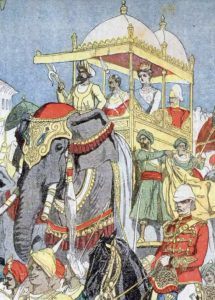William Dalrymple in The Guardian:
 On 24 September 1599, while William Shakespeare was mulling over a draft of Hamlet in his house downriver from the Globe in Southwark, a mile to the north a motley group of Londoners were gathering in a half-timbered Tudor hall. The men had come together to petition the ageing Elizabeth I, then a bewigged and painted sexagenarian, to start up a company “to venter in a voiage to ye Est Indies”.
On 24 September 1599, while William Shakespeare was mulling over a draft of Hamlet in his house downriver from the Globe in Southwark, a mile to the north a motley group of Londoners were gathering in a half-timbered Tudor hall. The men had come together to petition the ageing Elizabeth I, then a bewigged and painted sexagenarian, to start up a company “to venter in a voiage to ye Est Indies”.
The East India Company quickly grew into the world’s first and most powerful multinational corporation, and the one that, more than any other in history, would transform not just patterns of global trade but the globe itself. Before long a mere handful of businessmen from a distant island on the rim of Europe had made themselves masters of a subcontinent whose inhabitants numbered 50 to 60 million. They succeeded the mighty Mughalempire where even minor provincial nawabs and governors ruled over vast areas, larger in both size and population than the biggest countries of Europe, so reversing the balance of trade that from Roman times on had drained western bullion eastwards.
Over the course of three and half centuries, a whole British colonial world was founded to exploit and administer these conquests, a world with its own peculiar argot, its own institutions, its idiosyncratic snobberies and social hierarchies, its own educational establishments and career paths – an empire within an empire. When the British finally left India in 1947, nearly 350 years after the founding of the East India Company, that world dissolved overnight. Perhaps it is only possible now, more than 70 years later, in an age when the imperial British feel almost as distant a part of history as the imperial Romans, for this expatriate society to receive the particular attention that its idiosyncrasy deserves.
More here.
